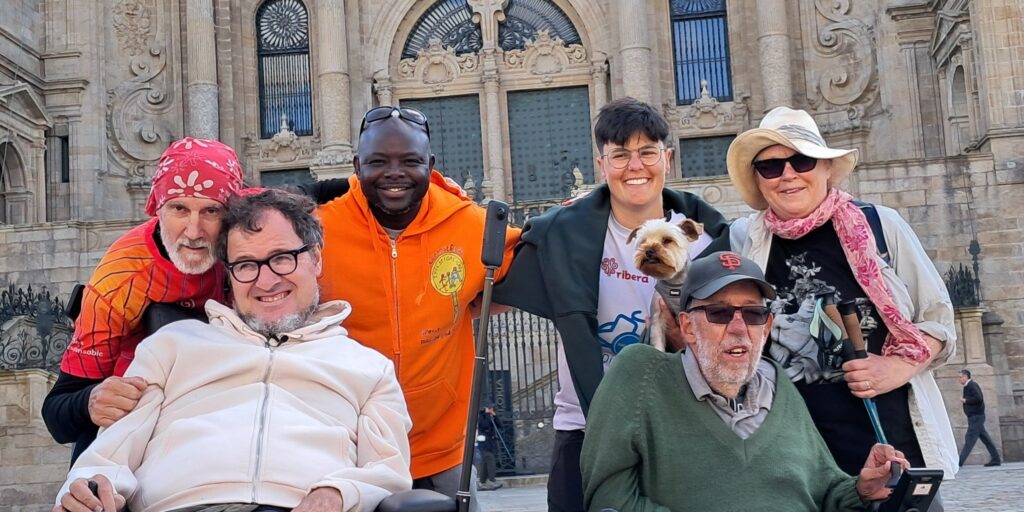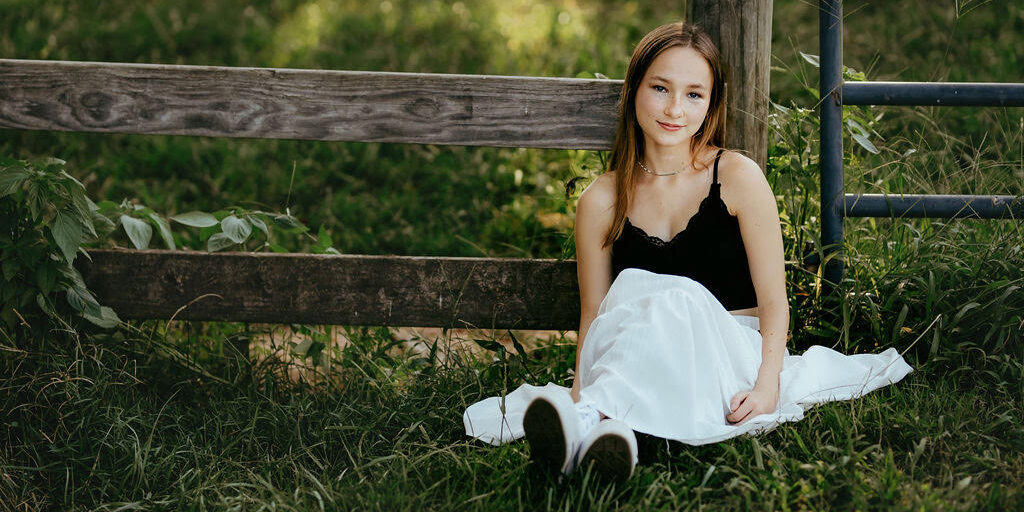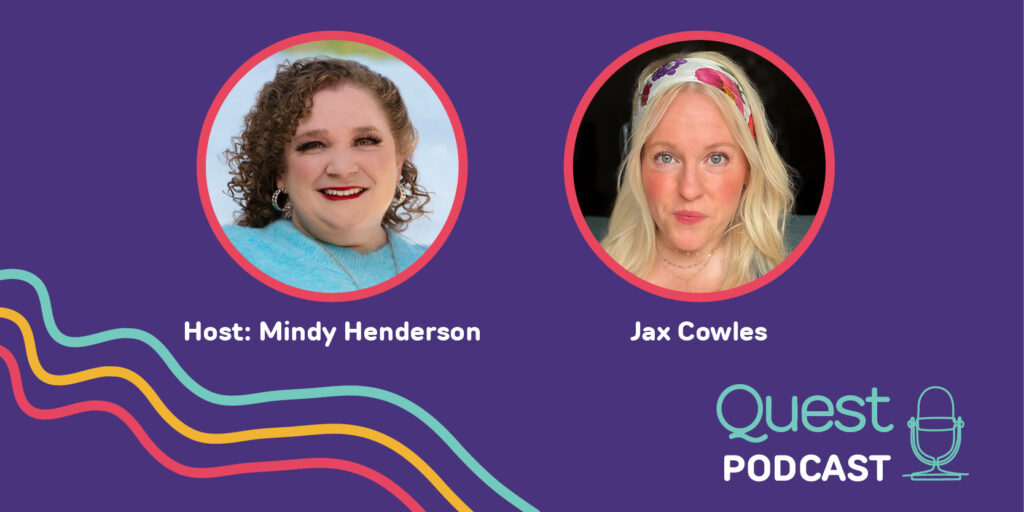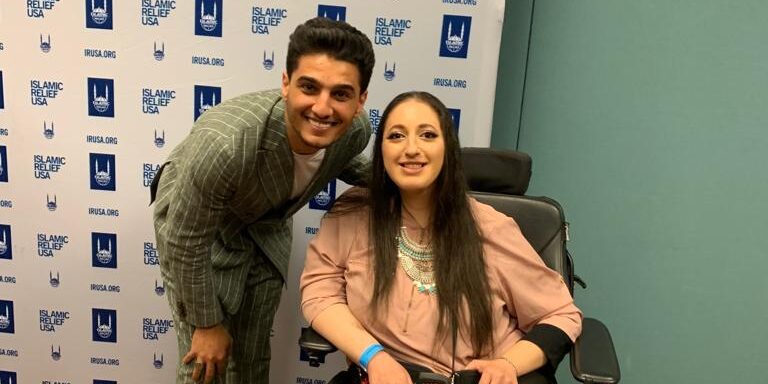
MDA Ambassador Guest Blog: Breaking the Chains of Stigma in My Arab Community
By Samaher (Sam) Abuzahriyeh | Monday, November 24, 2025
5 Second Summary
MDA Ambassadors play an essential role in furthering MDA’s mission while representing and empowering the neuromuscular disease community. Quest Ambassador Guest Blog series provides a platform to share their personal stories, perspectives, and experience.
Samaher (Sam) Abuzahriyeh is 33 years old and lives in Millbrae, CA. She was diagnosed with limb-girdle muscular dystrophy (LGMD) at age 6 and began using a power wheelchair at age 17. She enjoys writing poetry in Arabic, watching shows across genres and languages, exploring accessible trails and scenic spots in the Bay Area with her family, and discovering new bakeries and cuisines from different cultures.

Dancing with my parents at my brother’s wedding (April 2025)
I was born and raised in California, in an Arab household, surrounded by warmth, family, and support. As the first-born child, my mother noticed early signs of weakness and tiptoeing when I was three years old. By the age of six, I was diagnosed with beta-sarcoglycan deficiency, and in the fourth grade, I learned that I had a progressive condition called limb-girdle muscular dystrophy (LGMD). At that age, I didn’t fully understand what the diagnosis meant or how it would affect my life.
As I grew older, I began to recognize the deep-rooted stigmas and attitudes surrounding disability within the Arab community. Even though I had an uncle with the same condition, he never talked about it openly. Instead, he would make up wild stories about how he became disabled. Seeing someone so close avoid speaking about their disability revealed a painful reality: in many Arab households, disability is often met with shame, denial, fear, and prejudice. People with disabilities are often labeled as “not normal,” “a burden,” or “a failure.” Such labels can weigh heavily on a person’s sense of self, leaving them feeling incapable, unworthy, and misunderstood.
My mother faced her share of blame and judgment for giving birth to a child who wasn’t considered “healthy.” My grandfather tried everything he could from different diets, supplements, and even religious practices in hopes of “curing” me. As an adolescent who relied on a walker for mobility, I was kept at home during weddings and community gatherings, while my cousins my age were free to attend and enjoy themselves. Although my family acted out of love and protection, their fear of judgment from the community left me feeling isolated and unseen.
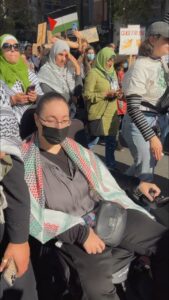
At a protest in San Francisco for Gaza (October 2023)
When my uncle passed away in 2015, it profoundly changed my perspective on life. He was only 32 years old when he died from complications following gallbladder surgery that led to sepsis. I remember feeling an ache that words couldn’t describe, not only because I lost him, but also because of the quiet, confined life he had lived. He spent the majority of his days at home, watching movies, rarely stepping into the world beyond his walls. He avoided Arab gatherings, community events, and places where he might be seen because he carried the heavy burden of stigma, both from within and from the society around him.
After his death, I made a promise to myself: I will not live a life hidden in the shadows of shame or fear. I refuse to silence parts of myself to make others comfortable. My disability is not something to fix, hide, or apologize for—it’s a defining part of who I am. Every challenge I have faced and every victory I have achieved has shaped my character, my resilience, and my outlook on life. I vowed to live with purpose and authenticity, to show that true strength is measured not by physical ability, but by courage, perseverance, and self-acceptance. I want to become the voice my younger self needed to hear, and the representation my uncle never had.
I was determined to challenge the notions and stereotypes about disability within the Arab community. I began with my inner circle, educating my extended family and relatives. For example, I would answer my cousins’ questions about my daily life, helping them understand my experiences and breaking down misconceptions and biases. I also started sharing my story publicly, whether online or in conversations with people I met at events, hoping that visibility could help change perceptions. Over time, I became more comfortable in community spaces; I no longer shied away from Arab festivals, concerts, protests, or family gatherings. I love meeting new people, sharing my story, and educating others about my disability, turning each interaction into an opportunity to challenge stigma and foster understanding.
Beyond education and visibility, I also celebrate my achievements, including earning my bachelor’s degree, tutoring others, and working as a mental health coach at
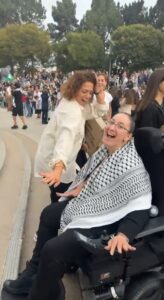
Dancing with a stranger at Palestine Day (September 2022)
MindRight. In that role, I used psychoeducation and evidence-based practices to support students affected by trauma, offering guidance and a listening ear as they navigated the challenges of their everyday lives. These accomplishments directly challenge the stereotypes and low expectations often imposed on people with disabilities in the Arab community, showing that disability does not define ability or limit potential. More recently, I applied to volunteer as a Peer Buddy with MUHSEN, a nonprofit that advocates for and supports people with disabilities in the Muslim community, where I look forward to connecting virtually with individuals who have special needs. With Muhsen’s strong presence in the Arab community, I hope to be a positive voice, to help challenge stigma, and inspire others to embrace their abilities with pride and confidence.
While I still encounter stares or awkward smiles from time to time, they no longer hold me back. One of my proudest moments was attending my brother’s wedding, walking in front of 600 guests, smiling, dancing, and celebrating freely. It was especially meaningful because it took place in front of the very Arab community that once kept me hidden, a community whose judgment and whispers I had long feared. In that moment, I felt the chains of stigma break, and the fear and hesitation that once held me back fade away. I was fully seen, fully present, and unapologetically myself—a living testament to my courage, strength, and the beauty that comes from embracing my own identity.
Next Steps and Useful Resources
- For more information about the signs and symptoms of Limb Girdle muscular dystrophy (LGMD) , as well an overview of diagnosis and treatment concerns, an in-depth review can be found here.
- Browse MDA’s Mental Health Hub.
- MDA’s Resource Center provides support, guidance, and resources for patients and families. Contact the MDA Resource Center at 1-833-ASK-MDA1 or ResourceCenter@mdausa.org
- Stay up-to-date on Quest content! Subscribe to Quest Magazine and Newsletter.
TAGS: Ambassador Guest Blog, Ambassadors, Community, Mental Health, Relationships, Young Adults
TYPE: Blog Post
Disclaimer: No content on this site should ever be used as a substitute for direct medical advice from your doctor or other qualified clinician.


